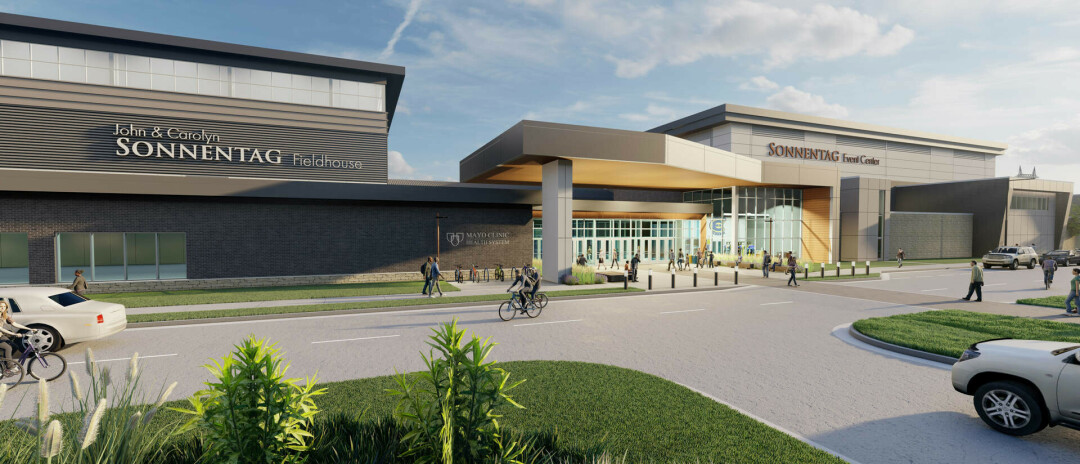Development On Campus Environment
SONNENTAG CENTER GOES GREEN: $12M Pledged Toward UWEC Facility’s Sustainability
Pablo Foundation commits nearly $10M for project

Ground will officially be broken April 25 for UW-Eau Claire’s huge new event complex, but the university and its partners broke another kind of ground Thursday with an announcement about the facility’s environmental sustainability.
Together, the Pablo Foundation, the university, its students, the City of Eau Claire, and Xcel Energy are combining to invest more than $12 million to reduce the future County Materials Complex’s carbon footprint and to ensure it can be powered by up to 100% carbon-free energy sources, university officials announced at a news conference.
“The city of Eau Claire and Xcel Energy have been steadfast partners, and the Pablo Foundation is truly the wind beneath our wings,” UWEC Chancellor James Schmidt said. “Not only is their generosity powering the building, but it is giving us the courage and determination to continue to work aggressively to reduce our carbon footprint and to build new buildings that will not only serve our students but that will have a role in ensuring a healthy world for future generations.”
The County Materials Complex will be built on Menomonie Street on land donated by UWEC alums John and Carolyn Sonnentag. It will include the Sonnentag Event Center, the Sonnentag Fieldhouse, and a Mayo Clinic Health System Diagnostic Imaging and Sports Medicine Center. The project’s entire cost will be $100.6 million, $70 million of which will be a gift from the Sonnentags. The facility is slated to be completed by 2024.
”
True to our mission, this project prioritizes our planet, and it is our sincere hope that the carbon-reducing features of the Sonnentag Center will serve as a model, to be replicated again and again in our community, and even across the nation.
MAIVUE XIONG
EXECUTIVE DIRECTOR, PABLO FOUNDATION
Among numerous earth-friendly features, the facility will be powered through a local solar resource, said Mark Stoering, president of Xcel’s operations in Wisconsin and Michigan.
The Pablo Foundation, an Eau Claire-based nonprofit, will be the biggest investor in the sustainability efforts: It is providing $9.997 million toward the project, Executive Director MaiVue Xiong said. Of that, $5 million will be in direct philanthropy while the rest will be a low-interest loan designed to be repaid with the facility’s energy savings. According to the university, “The Pablo Foundation funds will be used for geothermal wells, piping, a heat exchanger and pumps, additional electrical capacity, a high-performance glazing system for windows, and additional wall and roof insulation.”
“True to our mission, this project prioritizes our planet, and it is our sincere hope that the carbon-reducing features of the Sonnentag Center will serve as a model, to be replicated again and again in our community, and even across the nation,” Xiong said.
In addition to the Pablo Foundation’s commitment, the City of Eau Claire will contribute $1.5 million toward the project’s sustainability efforts, while UWEC students have provided $150,000 with another $200,000 possible after a forthcoming vote by the Student Senate. The additional student funding will help the facility pursue Leadership in Energy and Environmental Design (LEED) certification and WELL Health-Safety Rating (HSR).
David Delfosse, vice president of Ayres Associates, the Eau Claire-based architectural and engineering firm designing the facility, praised the university and its partners for their commitment to sustainability.
“As architects and engineers, we would love to design sustainability to this level and to this degree in all of our projects, but it really takes a passionate client that can put that objective into a project,” Delfosse said. “In this case, that passionate client is Kim Way and her team at Blugold Real Estate and UWEC.”
Among other elements, the County Materials Complex will be designed to be fully electric, negating the need for fossil fuel use, Delfosse said. In addition, plans call for the removal of 80% of suspended solids from stormwater runoff, green vehicle parking and electrical vehicle charging stations, native plants and a non-irrigated landscape, reduction of water use indoors by 30% and outdoors by 50%, and the construction of 200 geothermal wells to help heat and cool the building.
Find out more about the project online at uwec.edu.






















